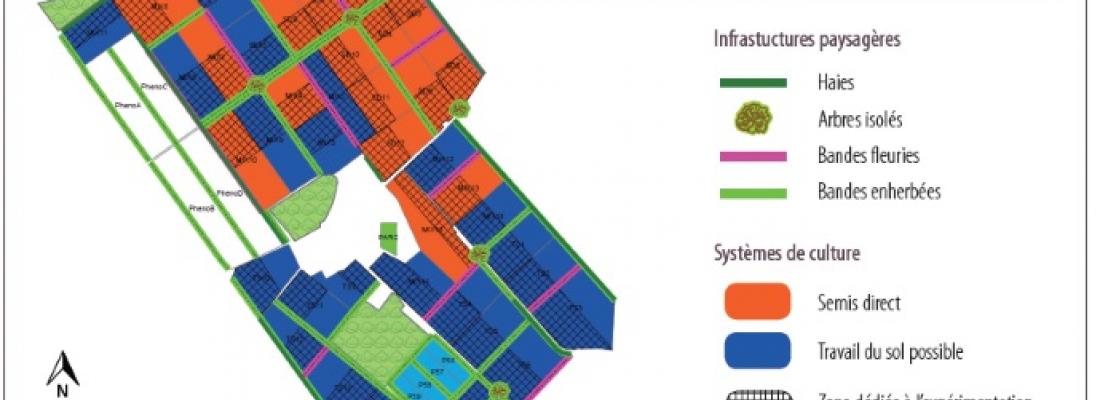Agroecology 5 min
CA-SYS: a collaborative platform for experimentation in agroecology
Through the CA-SYS platform (Co-designed Agroecological System Experiment), INRA and its partners are designing experiments on innovative and sustainable agroecological systems. This arable infrastructure is using new experimental methods by combining varietal breeding, a minimisation of inputs, the exploitation of biological interactions and the organisation of agricultural space.
Published on 23 February 2018

At the INRAE Experimental Farm in Époisses, on a series of plots set in a varied landscape, a variety of agroecological systems are being tested in order to reveal biotic regulation mechanisms under restricted input use.
Tests on multi-performance agroecological cropping systems
The platform has several objectives: (i) to gain a clearer understanding of the biological processes inherent in agroecological management; (ii) to design and evaluate new agroecological systems; (iii) to study the transition towards these new systems; (iv) to breed new varieties (design and evaluation of ideotypes) adapted to agroecological conditions and (v) to develop and renew experimental methods in order to generate knowledge of agroecological systems. Surrounded by important landscape features (woods, hedgerows and the plots divided by grass margins or flower strips, etc.), the use of no-till and tillage-based cropping systems is seeking to maximise functional biodiversity in order to regulate pests, fix atmospheric nitrogen and improve cycling, etc.
Two cropping systems compared at two levels of plant diversification
By maximising plant diversity and mobilising landscape infrastructures outside the cultivated plots, two main types of cropping system are being tested: one based on strategies that involve different tillage operations (occasional tillage, stale seedbed, mechanical weeding) and the other based on direct drilling under a cover crop with no tillage. In parallel, these two options will be explored by mobilising cultivated diversity in terms of both time (at the scale of the crop rotation) and space (mixtures of species and/or varieties). Numerous projects have already been initiated at the CA-SYS platform: "zero pesticide" cropping systems, the exploitation of plant covers, weed regulation or the development of new pea varieties (see insert below) etc., working with different partners in research and experimentation.
Perspectives
During 2018, the transition towards agroecological systems is being studied through (i) the joint design of systems in the context of multi-actor workshops, and (ii) characterisation of the initial status of the CA-SYS platform (soil, weeds, microbial and entomological diversity, etc.). The aim is to apply the principles of agroecology to the entire experimental farm starting as from the autumn of 2018, the ten-year goal being to achieve profitability and yields that are equivalent to the conventional systems used by neighbouring farmers though the exploitation of biotic interactions.
Cordeau S., Deytieux V., Lemanceau P., Marget P., 2015. Towards the establishment of an experimental research unit on Agroecology in France. In: Valuing Long-Term sites and Experiments for Agriculture and Ecology. Association of Applied Biologists, Newcastle (UK), p. 271-273.
